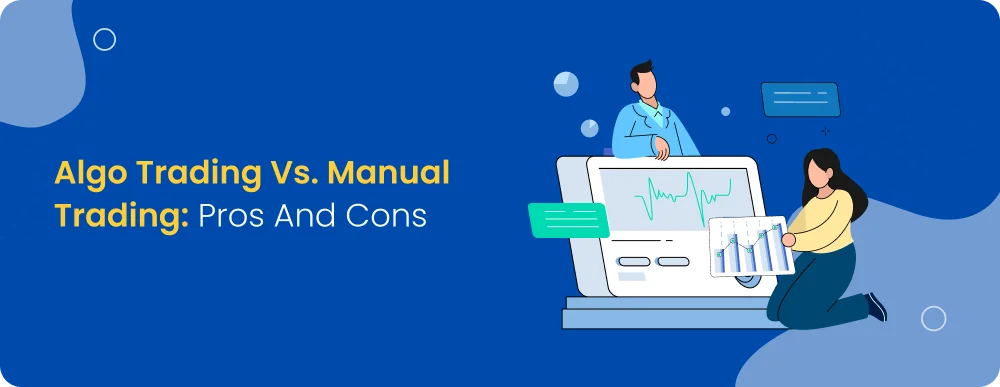Algo Trading vs. Manual Trading: Pros and Cons
Noor Kaur
20 Feb 2025Tags:
Featured
Both algo trading and manual trading have their strengths and limitations. While algo trading strategies provide speed and automation, manual trading allows for flexibility and human intuition. Understanding their pros and cons can help you choose the right approach for your trading style. Continue reading!
What is Algorithmic Trading?
Algo Trading uses computer software to execute trades automatically based on predetermined conditions. These programs follow specific algorithms to identify market opportunities, place orders, and manage risk without human intervention. Automated trading is widely used in financial trading for its speed, accuracy, and efficiency.
What is Manual Trading?
Manual trading refers to buying and selling assets without automation. You analyse market conditions, decide when to place trades, and execute them manually without using algorithms. This approach relies on personal judgment, experience, and market understanding.
Key Differences Between Algo and Manual Trading
Some major differences between algo and manual trading are:
Example of Algorithmic Trading in Action
Suppose a trader develops an algo trading strategy to buy a stock when its price drops by 2% and sell when it rises by 3%. The algorithm constantly scans the market and executes trades automatically when these conditions are met. Unlike manual trading, where decisions are delayed by emotions or human error, the algorithm reacts instantly, capturing opportunities as they arise.
Example of Manual Trading in Action
A trader analysing price charts and news decides to buy a stock based on recent earnings reports. They manually place a buy order, set a stop-loss (a price level where they will exit to avoid further losses), and monitor price movements to decide when to sell.
Advantages of Algorithmic Trading
Some primary benefits of algo trading are:
- Faster execution: Automated trading executes orders in milliseconds, reducing delays compared to manual trading.
- Removes emotional bias: Trades follow logic-based strategies, preventing impulsive decisions driven by fear or greed.
- Backtesting capabilities: Traders can test algo trading strategies on historical data to refine them before live trading.
- Market scalability: Algorithms can monitor multiple markets and trade across different assets, something difficult in manual trading.
- Cost efficiency: Automated systems reduce transaction costs by optimising order execution.
Also Read: The Importance of Backtesting Trading Strategies
Disadvantages of Algorithmic Trading
While algo trading offers speed and efficiency, it also comes with challenges that traders must consider.
- Technical Failures: Glitches, internet issues, or software bugs can cause failed or incorrect trades. Unlike manual trading, you may not always have real-time control over errors.
- Over-Optimisation Risks: Fine-tuning algo trading strategies using past data may create a system that works well historically but fails in live financial trading due to market unpredictability.
- Market Impact: Large orders executed instantly can influence prices, leading to slippage (when trades execute at a different price than expected).
- Lack of Human Judgment: Unlike manual trading, where traders adapt to unexpected events, automated trading follows predefined rules and may struggle with sudden market changes.
- Regulatory Restrictions: Some markets impose strict rules on algo trading, requiring traders to comply with legal and technical guidelines.
Advantages of Manual Trading
Some primary benefits of manual trading are:
- Flexibility: You can adapt to market news, trends, or unexpected events without pre-set rules.
- Better Risk Assessment: Human judgment helps avoid poor trades that algorithms might still execute.
- Personal Learning Curve: Trading manually helps you develop market experience and refine your skills.
Disadvantages of Manual Trading
In contrast, some disadvantages associated with manual trading are:
- Slower Execution: Unlike algo trading, manual trades take time, which can lead to missed opportunities.
- Emotional Decision-Making: Fear and greed can affect trade decisions, leading to impulsive actions.
- Limited Scalability: Managing multiple trades across different markets is challenging without automation.
Algo Trading vs. Manual Trading: A Quick Comparison
Which is Better: Algo Trading or Manual Trading?
The choice between algo and manual trading depends on your experience, trading goals, and risk tolerance.
- Algo Trading is ideal for automated execution, faster trades, and emotion-free decisions. It helps in high-frequency trading (HFT) and handling multiple trades simultaneously.
- Manual Trading suits traders who rely on personal judgment, market experience, and adaptability. It allows flexibility in changing market conditions but requires constant monitoring.
For many traders, a hybrid approach—using algo trading strategies for efficiency while applying manual oversight—can be the best option.
Conclusion
Neither algo trading nor manual trading is perfect. Automated trading is efficient but requires technical knowledge, while manual trading offers control but demands time and effort. Choosing between the two often comes down to experience, trading goals, risk tolerance, and how you operate within a stock trading app.
Explore Our Other Platforms
FAQs
How does algorithmic trading enhance trading speed and efficiency?
Algo trading executes trades in milliseconds, eliminating delays caused by human intervention. It scans multiple markets, processes vast amounts of data, and identifies opportunities instantly, improving execution speed and efficiency.
Can manual traders compete with algorithmic traders in today's market?
While manual trading allows flexibility and intuition, automated trading processes information faster and reacts instantly. Manual traders often use semi-automated tools or develop algo trading strategies to enhance their decision-making and stay competitive.
What are the risks involved in algorithmic trading?
Financial trading using algorithms carries risks such as technical failures, market volatility, and overfitting (when a strategy works well in testing but fails in live markets). Effective risk management, backtesting, and monitoring help mitigate these issues.
How do emotions affect manual trading decisions?
Fear and greed often lead to impulsive decisions in manual trading, causing traders to hold onto losing positions or exit profitable trades too early. Algo trading removes emotional bias by consistently following predefined strategies.
Are there any tools that combine the benefits of both algo and manual trading?
Yes, hybrid platforms offer features like automated trading signals with manual execution, allowing traders to maintain control while benefiting from algorithm-driven insights.
How can I transition from manual trading to algo trading effectively?
Start by learning algo trading strategies, backtesting different models, and using demo accounts. Gradually automate parts of your strategy while monitoring performance before fully shifting to automated trading.
Noor Kaur
20 Feb 2025Related blogs
Sign up to our newsletter !
Share this article on
Recent articles
Tags:
Open a Demat Account in just 15 minutes !

Click on open
account below

Fill out some
basic details

Upload your
documents

Start trading in
24 Hours *
Commonly asked questions
Is Master Capital Services Limited SEBI registered?
Do you have a mobile app for Trading and Finance Management?
What services does mastertrust provide?
What is the minimum investment required to start trading with your company?
Is my personal and financial information secure with your company?
What is your customer support availability?





